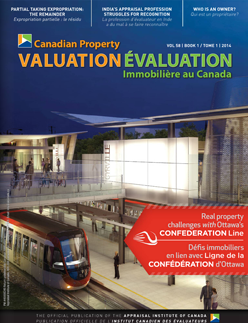Who is an owner?
Canadian Property Valuation Magazine
Search the Library Online
By John Shevchuk, Barrister & Solicitor, C. Arb, AACI (Hon)
Introduction
When land is expropriated, the holder of the fee simple interest in the land is entitled to compensation, but the question arises as to who else must be compensated. Does the holder of a life estate in the subject property receive compensation? How about a judgement holder, a tenant, a mortgagee, the holder of the beneficial interest under a trust or a mere occupant of the land?
In most Canadian jurisdictions, compensation depends upon being an ‘owner,’ as defined in the particular expropriation legislation for a jurisdiction. Consequently, it is crucial that appraisers and lawyers understand which holders of rights, estates and interests in land qualify under the definitions of ‘owner’ for expropriation purposes. This requires an understanding of the words and phrases that are used in the definitions and an awareness of how the words and phrases have been interpreted by the courts in a particular jurisdiction.
This article provides a survey of the definitions of ‘owner’ in Canadian expropriation legislation and examples of how tribunals and courts deal with issues surrounding ‘owners’ for the purposes of expropriation.
Definitions of ‘owner’ in Canadian expropriation legislation
In Canada, the spectrum for definitions of ‘owner’ range from use of few words to multi-paragraph descriptions. An example of the former is the definition adopted by Nunavut (Northwest Territories), which simply provides “‘owner,’ in relation to an expropriated interest, includes the owner of a leasehold interest.” In Newfoundland and Labrador, an ‘owner’ is defined to include a “purported owner.” Federally, no definition of ‘owner’ is provided.
British Columbia has adopted a more extensive definition:
‘owner,’ in relation to land, means
(a) a person who has an estate, interest, right or title in or to the land including a person who holds a subsisting judgment or builder’s lien,
(b) a committee under the Patients Property Act,
(b.1) an attorney under Part 2 of the Power of Attorney Act,
(b.2) a guardian, executor, administrator or trustee in whom land is vested, or
(c) a person who is in legal possession or occupation of land, other than a person who leases residential premises under an agreement that has a term of less than one year
Definitions in other parts of the country use a variety of terms and phrases. The Alberta definition of ‘owner,’ among other things, speaks of “any other person who is known by the expropriating authority to have an interest in the land.”
Several provinces specifically refer to mortgages and mortgagees and provide a definition of ‘registered owner.’
In New Brunswick, the definition of ‘owner,’ under the expropriation legislation, simply includes “any person holding an estate, easement, licence or other right or interest in, to, over or affecting land.”
In Prince Edward Island and the Yukon Territories, the definition of ‘owner’ makes mention of “mortgagee, lessee, tenant, occupant and person entitled to a limited estate or interest …”8 The Yukon Territories definition adds “execution creditor.”
In Quebec, the expropriation legislation speaks of “the owner of the immovable or the holder of the immovable real right to be expropriated,” consistent with the concepts of property rights under the Civil Code.
However, no matter how extensive the definition of ‘owner,’ the case law still requires review to determine how courts and expropriation tribunals have interpreted the definitions.
Examples from the case law
Occupation
Occupation is a popular concept in the definitions of ‘owner.’ The question is the degree of occupation that will suffice. In British Columbia, a contractor under a CCDC construction contract relating to recently expropriated land missed the limitation period for filing a Claim of Builder’s Lien. The contractor attempted to overcome this hurdle by arguing that it was an occupant of the land by virtue of the construction contract and the activity on site. The court disagreed, noting that the contractor’s rights were to be found in the contract. There was only sufficient possession to undertake the work. The court found that “legal possession or occupation of land” in the legislation meant something more than a mere right to be on the land. It must be close to an interest in land. There must be a benefit derived from the land itself.
However, while the law in British Columbia might require that a benefit be derived from the land as a prerequisite to being an ‘owner,’ exclusive occupation or a form of occupation enabling an action in trespass is likely not required to be an ‘owner’ in that province. Thus, it is at least arguable that a highway project that interfered with rights under a provincial grazing licence can give rise to compensation.
Inferred/implied interests
Company A, as owner of an auto wrecking yard, allowed Company B to use a portion of the yard for its business. There was common ownership of the two companies. This common ownership and control was enough for the tribunal to hold that it was in Company A’s interest to ensure that Company B continued its operation from the subject property and Company B would have no concern about its continued right to do so. Company B was found to have a compensable right in the expropriated land.
An owner of two parcels sold one, but continued to gain access to the remaining parcel through the parcel that was sold. There was no express reservation of an easement for the vendor’s benefit. Nevertheless, the tribunal held that the purchaser knew and approved of the access over its property and, therefore, there was an implied easement in favour of the vendor giving the vendor a compensable interest that had been expropriated.
Unregistered interests
In British Columbia, there is no need to serve holders of unregistered interests with notice of an expropriation, but the holders of such interests are entitled to compensation. Of practical significance is the Court of Appeal’s decision that the time limit imposed for seeking compensation under expropriation legislation is triggered by the payment of an ‘advance payment.’ Without an advance payment, the time limit in which to commence a claim for compensation does not apply.
Combining of interests
The owner of the fee simple interest in a gas station also leased the adjacent site and used it in the operation of the gas station. A supporting column for a light rapid transit system was erected on the leased parcel. The court agreed with the expropriation tribunal that the leasehold interest and the fee simple interest resulted in a unified ownership for the purposes of determining the compensation for a partial taking.
Trust arrangements
Most jurisdictions expressly contemplate that land may be held by a trustee and that the underlying holders of beneficial interests are entitled to compensation. At least in British Columbia, unregistered beneficial owners may not be entitled to notice of expropriation, but they can claim for compensation.
Profit a prendre
A right to remove all natural material in situ from particular lands has been held to be a profit a prendre, giving an interest in lands and making the holder of the right an owner under the expropriation legislation.
Parking lots adjacent to a restaurant
The tenant of premises used as a restaurant could not obtain compensation when the adjacent parking lot was partially expropriated. The tribunal interpreted the terms of the lease as requiring reasonable access to the restaurant, but not reasonable use of parking facilities. The case is an indication of the fact dependent nature of expropriation cases.
Imperfect sublease arrangements
A claimant occupied a water lot pursuant to a sublease. The sub-landlord did not obtain the owner’s approval for the sublease, but the owner had actual knowledge of the sublease. The expropriating authority’s argument that the claimant was not an ‘owner,’ because it was not in legal possession, was not accepted. The tribunal found that the claimant was at least in legal possession, but that the claimant had not established that there had been an expropriation.
Leases
It may be that technical reasons prevent persons from qualifying as tenants or lessees, but it may be possible for such persons to qualify as occupants under the various ‘owner’ definitions.
Conclusion
Clearly, the identification of parties who could be ‘owners’ under expropriation legislation is often not straightforward. While review of the title to the subject property is the obvious first task, additional steps will include:
- a review of the applicable definition of ‘owner’ and the notice and compensation sections in the applicable expropriation legislation;
- gaining an understanding for the specific types of estates and interests that make a person an ‘owner;’
- a review of case law to learn how the courts of a given jurisdiction have interpreted the definition of ‘owner;’ and
- an inquiry of the known owners of interests in the subject property to identify potential other parties.
End notes
Expropriation Act, RSNWT 1988, c E-11, s 1
2 Expropriation Act, RSNL 1990, c E-19, s 2
3 Expropriation Act, RSC 1985, c E-21, s 7
4 Expropriation Act, RSBC 1996, c 125
5 Expropriation Act, RSA 2000, c E-13, s 1
6 Expropriation Act, CCSM, c E190, s 1; Expropriations Act, RSO 1990, c E.26, s 1; Expropriation Act, RSNS 1989, c 156, s 3; Expropriation Act, RSS 1989, c 156, s 1
7 Expropriation Act, RSNB 1973, c E-14, s 1
8 Expropriation Act, RSPEI 1988, c E-13, s 1; Expropriation Act, RSY 2002, c 81, s 1
9 Expropriation Act, CQLR, c E-24, c 40
10 Linear Construction Corp. v British Columbia (Minister of Transportation & Highways), 1997 CarswellBC 2874 (BCCA)
11 Douglas Lake Cattle Co v British Columbia, [1990] BCJ No 2307 (QL) (BCCA)
12 Al’s Auto Wrecking Ltd v Surrey (City), 2006 CarswellBC 646 (BCECB)
13 Captain’s Square Holdings Ltd. v British Columbia (Minister of Transportation & Highways), 1997 CarswellBC 3149
14 Van Kam Freightways Ltd v Kelowna (City) 2007 BCCA 287; British Columbia v Schneider, [1996] BCJ No 1977 (QL) (BCCA)
15 Holdom v British Columbia Transit 2006 BCCA 282
16 Schneider, supra; Pentecostal Assemblies of Canada v British Columbia (Minister of Transportation & Highways), 1999 CarswellBC 1710 (BCECB)
17 McPhail’s Equipment Co v Surrey (City), 1995 CarswellBC 2593; Langdale Landing Properties Ltd. v British Columbia 2003 CarswellBC 3556 (BCECB)
18 Anderson v British Columbia (Minister of Transportation & Highways), 1995 CarswellBC 2585 (BCECB)
19 Vancouver Marina (1971) Ltd v British Columbia (Minister of Transportation & Highways), 2000 CarswellBC 2883 (BCECB)
20 Maddock v Surrey (City), 2001 CarswellBC 3278 (BCECB); El & El Investments Ltd v Surrey School District No. 36, 1995 CarswellBC 2574 (BCECB)
Note: This article is provided for the purposes of generating discussion and to make practitioners aware of certain challenges presented in the law. It is not to be taken as legal advice. Any questions relating to the applicability of expropriation legislation in particular circumstances should be put to qualified legal and appraisal practitioners.
-30-





